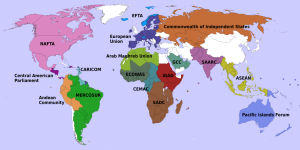1] Condition of State in the Advanced Industrial States
Advanced industrial states are those countries where industries dominate the mode of production. The industrial revolution was the first to take place in these countries. e.g. UK, France, USA, Canada, Germany and some east European countries also like Russia.
(Advanced industrial states should not be confused with Capitalist countries, which refer to states whose economies are primarily organised around private ownership of the means of production and market-driven mechanisms of exchange i.e. countries like the USA, France, UK etc. This category does not include Russia, China etc. which run on the logic of socialism.)
The developed countries are known as advanced industrial states. They have been the imperial powers in the past and continue to have dominance in politics, economics, cultural and ideological sphere even after the formal end of decolonization.
They can be called the global north, OECD countries (Organization for Economic Cooperation and Development). To use Marxist terminology, they are the core countries, and from a Marxist point of view, the drain of wealth is continuing.
Till the end of cold-war, advanced industrial states were divided into two blocks. The capitalist block and the socialist block.
The socialist block countries could not sustain themselves. With the collapse of communism, they also adopted the western model of politics and economy. Many of these countries are now developing countries despite having an industrial base.
From the end of the cold war till the beginning of the 21st century, western countries have been in a dominant position. However, from 2001 onwards, there has been a decline in the hegemony of the west marked by the rise of the east. The centre of gravity started shifting towards the Asia Pacific from Atlantic.
BRICS countries started giving challenge to these countries in different sectors. The most affected sector in these countries is manufacturing and low-skilled workers.
Since the 2008 global financial crisis, advanced industrial states have been facing an economic and political crisis. Whether in western Europe or in the USA, there is a rise of neo-rightist and neo-fascist. These countries have become susceptible to the political agenda of populist parties.
Populist parties got a new lease of life because of the combination of economic crisis, the migration crisis, transnational terrorism and Islamophobia. The rights victory started in Poland and Hungary, reaching France, Germany, Netherlands and Sweden. The same is the situation in the USA. In the end, we can say that these countries are also in a state of transition.
2] Nature of State in Capitalist Economies
The nature of state in capitalist countries can be regarded as a highly democratic state. The people in these countries have historically struggled to establish the kind of state that we witness today. There is a high awareness of privileges/ rights among citizenry.
However, the awareness does not guarantee the realization of such rights. As suggested by Marxist scholars, the states in these countries are an instrument of the capitalist class. There is no surety that the state policies will be in for the benefit of all people. As suggested by elitist scholars, power always lies with elites & is exercised for their benefit.
Increasing globalization and outsourcing in these countries have also led to job losses and unemployment. The economic growth rate has stagnated. And at times, we also witness backlash against the state e.g. Occupy Wall Street, the Yellow Vest movement, ‘Black Lives Matters’ etc.
Changing Nature of the State in Capitalist Economies
When capitalism comes into crisis, we see the emergence of two trends, either the rise of right or left. In some countries, there is a trend of rise of the left also, like France, Greece, and Britain.
There is also the growth of right, e.g. In USA, Britain, France, Netherlands, Sweden.
There is a fear of the rise of neo-fascism in the capitalist countries of the world under the pressure of financial crisis.
3] Nature of state in Socialist Countries
Socialist countries started with the hope that state will wither away. However after communist revolutions, very powerful states came into existence. In place of dictatorship of proletariat, these states became the dictatorship of communist parties.
As far as Russia and other east European countries are concerned, communism collapsed and countries adopted democracy, explained by Samuel P Huntington and third wave of democracy.
However the transition from authoritarianism towards democracy remains a farfetched dream. Majority of the countries have gone back towards the path of authoritarianism or semi-authoritarianism. e.g. Russia, Countries of Central Asia, East European countries like Belarus, Ukraine and even Hungary. These countries also show the neo-fascist authoritarian trends.
Similarly in China, we have seen the tightening of the control of the communist party on the society and the tightening of the control of the party by the leader. There is no change in dictatorial trend in North Korea.
The other islands of socialism like Cuba, continues to be one-party-state but it is not as exploitative as the other socialist countries.
There has been rise of socialist parties in Latin American countries like Venezuela, Bolivia. Venezuela is facing multiple crisis for external and internal reasons.
4] Nature of state in Developing Countries
Developing countries are post-colonial society also known as global south. Despite economic progress in last decades, these countries continue to suffer from issues of poverty, malnutrition etc.
The study of developing area has been the major preoccupation of the scholars of modern comparative politics. The nature and the changing trend can be discussed by utilizing various methods which had been developed in comparative politics primarily for these countries only.
For example if we apply political development approach these countries can be called as ‘prismatic societies’ in the words of F W Riggs. Gunnar Myrdal has given the concept of soft state in case of India. If we apply the idea of Samuel P Huntington, most of these states have witnessed ‘political decay’. In the words of Riggs, they are under ‘development trap’.
The neo-Marxist, the scholars of dependency school calls the states as peripheries, the ruling class acting as the instrument of the bourgeoise sitting in metropolitan or core regions. Hamza Alvi using structuralist approach called the post-colonial states as overdeveloped states.
Since 1990s most of the countries had shifted towards the model of liberal democracy with the exception of China, North Korea, Cuba, Iran and the monarchies of the Gulf and few pockets in Africa. Out of these countries with the exception of India, democracy remains too fragile and they continue to be semi-authoritarian states.
The states of these countries are not isolated from the global trend. Around the world there is a decline of the liberal world order. Liberalism and the rise of right and left. Even in third world countries we see the rise of rightist parties and authoritarian leaders.
—
* [ The questions from this topics are usually dynamic. Many questions can be answered on overall understanding of the subject, than specific syllabus for this topic.
Study PSIR 1A -> Topic 2 -> Theories of State along with study of this topic.
Also study PSIR 2A Topic 11.1-> Democracy
Along with above two topics, keep track of current affairs, specifically trends related to internal political happenings in major countries. While you may not get a direct question on such matters, a reference to them as examples in your answers will certainly fetch you extra marks.]









